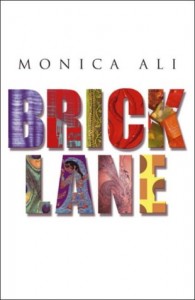 Not sure what to write about this. I enjoyed the story and it was well-written, but to me nothing special. Hated the ending – don’t worry, I won’t give it away, but the last line just sounded so corny I was quite shocked. The book as a whole is not simplistic, but the ending made it seem that way.
Not sure what to write about this. I enjoyed the story and it was well-written, but to me nothing special. Hated the ending – don’t worry, I won’t give it away, but the last line just sounded so corny I was quite shocked. The book as a whole is not simplistic, but the ending made it seem that way.
I think maybe this is one of those cases where the hype was so massive that the reality is bound to disappoint. It was an interesting depiction of a woman who moves to England in an arranged marriage and gradually, over decades, changes from someone who accepts her fate to someone who takes charge of it.
Part of the difficulty of the book lies in the fact that for much of it, Nazneen is so accepting of her fate. This is consistent with the character, but doesn’t make for a great story until much later in the book where she starts to take action. Unfortunately some of the things she does when she starts to take action are not very believable, like joining an activist group and having an affair with its organiser. It’s quite a big leap, and didn’t convince me totally.
Overall I don’t regret reading this, but I do feel as if I would have been better off reading it with lower expectations.
Click here to read more of my book reviews. Or click here to read other people’s reviews of Brick Lane on Amazon.



There are 4 comments
I also had high hopes for this novel, but I’m afraid I gave up on it halfway through. I agree that it was an interesting depiction of a woman who moves to England in an arranged marriage, but after a while I became bored with the story, precisely because Nazneen was so accepting of her fate. I heard a lot of hype about this book beforehand and did wonder if that played a part in my disappointment. I had a similar reaction to The Thirteenth Tale by Diane Setterfield, which I was expecting to enjoy.
If you’ll remember I read this for my class in London. I mentioned it at teh cafe. I really didn’t like it. Part of my disappointment was that I was comparing Ali with Lahiri whose writing I just love. But the other thing I hated was the treatment of Chanu’s character. The man turns into a disgusting toad and yet…. I just thought Nazneen for all her “big decisions” couldn’t make up her mind about him…. and that just drove me a little crazy. I agree with you about that last line.. it comes from her most nascent sense of awareness…. and at that point it’s not a move forward but backward and corny!!
If you’re interested in another Indian author I highly recommend Roy’s God of Small Things. I read that this past summer and I read the second half again for one of my last classes and It was as fresh and poignant as ever. The writing is unusual. It has this playful lyrical quality that can be difficult at first… especially considering the difficult subjects it deals with.
Hi Lisa
I agree, the hype does raise expectations. I had the same issue with The Brief Wondrous Life of Oscar Wao. Maybe by now I should be inured to hype, but I suppose at some level I believe it and am disappointed that the book doesn’t live up to it.
Charles, yes I do remember now! Thanks for the recommendation. I picked up God of Small Things once, quite a while ago now, and found the writing beautiful at first, but then somehow too much. Too playful, too lyrical, too eager to draw attention to itself. But maybe I should have stuck with it – I often find that if I do, I get used to a writer’s style and enjoy the book more in the end. Might go back to it.
Hi Andrew,
I must admit that to some in the class the language was a distraction. I rather enjoyed it. The use of language is all over the book in many different ways. It makes a demarcation between characters. It is to some extent a defense mechanism or a weapon for characters. It also makes the relative silences as the story unravels all the more effective. The contrast is powerful. For me it made a challenging read very worth while but again it won’t work for everyone.